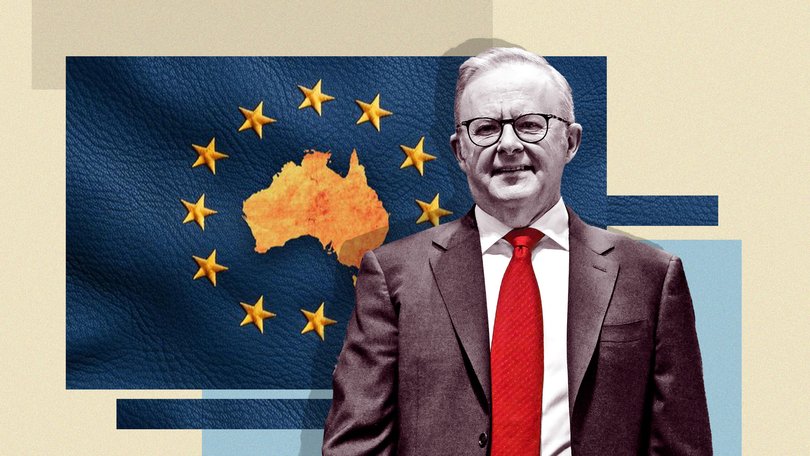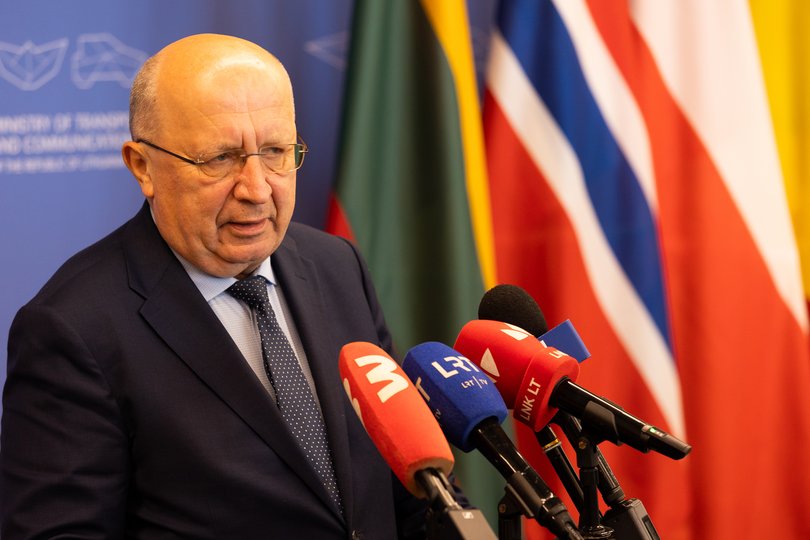Europe will be a ‘reliable’ defence partner for Australia, Defence Commissioner Andrius Kubilius says
LATIKA M BOURKE: The EU’s first-ever Commissioner for Defence and Space has vowed Europe will be a reliable partner to Australia today and always amid growing uncertainty over the AUKUS agreement.

In an exclusive interview with The Nightly, Andrius Kubilius, the EU’s first-ever Commissioner for Defence and Space, vowed Europe would be a reliable partner today and always, when asked about the United States ordering an “America First” review into whether to not to nix AUKUS.
European Commission President Ursula von der Leyen offered Mr Albanese a security and defence partnership at their bilateral meeting on the sidelines of Pope Leo XIV’s inaugural mass in Rome last month.
But Prime Minister Anthony Albanese was barely enthusiastic about the idea, and appeared to confuse it with Australia’s existing collaboration with NATO, the treaty member military Alliance that involves the US, Canada and Europe and collaborates with four Indo-Pacific countries on how to counter China.
Sign up to The Nightly's newsletters.
Get the first look at the digital newspaper, curated daily stories and breaking headlines delivered to your inbox.
By continuing you agree to our Terms and Privacy Policy.However, sources are confident that he is poised to agree to formally open talks on a partnership when he meets President von der Leyen on the sidelines of the G7 summit in Canada on Tuesday.
Mr Albanese will discuss the agreement with President von der Leyen on what was set to be the same day of his meeting with Donald Trump,
However those plans have been thrown into disarray by the US President’s announcement that he would be flying out of the Canada summit a day early.
Before the cancellation, the Prime Minister was aiming to use the meeting to desperately lobby Mr Trump to squelch any resistance within his Administration to AUKUS and ensure the agreement to have the US transfer Virginia-class submarines to Australia by the early 2030s will go ahead as pledged.
But the threat of the review has plunged the program into doubt and will add to Australians’ dislike of Mr Trump and declining trust in the US under his leadership.
Commissioner Kubilius would not directly comment on whether the AUKUS review exposed the United States as an unreliable partner, but pledged that Europe would always keep its word as a defence partner.
“I would not elaborate too much on that, but we consider that reliability is one of the most important features in global development, in global cooperation,” Commissioner Kubilius said in a 20-minute video interview on Zoom from Strasbourg.
“And that is why we treasure our own reliability very much.
“And definitely we want to develop stronger connections, stronger relationships with reliable partners — that’s also our wish.
“Your relationship with the United States, of course, we cannot judge to make any kind of conclusions but … we definitely are reliable partners and we shall stay as a reliable partner.”
Last week, NATO boss Mark Rutte said Europe had made pledges on defence spending but nothing happened until President Trump was elected, and then “everyone woke up.”
Mr Trump’s complaints that Europe and NATO have been freeloading off the Americans to fund the continent’s security have included threats to withdraw the US from NATO and the prospect of warmer relations with Russia’s President Vladimir Putin.
This has sparked a rapid boost in planned defence spending from individual European nations, backed by the European Commission’s ReArm program valued at up to €800 billion.
The EU will allow member states to raise more debt – up to €650 billion – and will release an additional €150 billion in so-called Security Action for Europe (SAFE) loans for investments in missiles, drones and cybersecurity.
Mr Kubilius is from Lithuania, a Baltic and formerly Soviet-occupied state that has been amongst the EU and NATO’s strongest advocates for a more defence-ready Europe.
His appointment to a newly created role late last year was designed to signal that Europe has received the message and is stepping up.
Mr Kubilius said rather than Mr Trump, it was Mr Putin, and his full-scale invasion of Ukraine, that was responsible for the urgency now gripping Europe.
“It’s a big shift, definitely,” he said.
“Even the creation of my position – Commissioner on Defence and Crisis – it shows what the shift is in European mindset.
“We were enjoying the so-called peace dividend, we were expecting that the Americans forever will guarantee our security – times are changing.”
Citing the German intelligence warning that Russia could be ready to test NATO within the next five years, he said: “We understand that we need to step up our defence readiness.”
Mr Kubilius said this had spurred a European desire to build and unite “as strong as possible a community of like-minded countries”.
He said that was the reason for the bespoke security deals that were being offered to only a handful of countries outside the EU’s single market.
The agreements, while broadly worded, express desires to work together on common security challenges, including how to make more weapons faster and make taxpayer-funded defence dollars go further.

“The first partnerships were signed with Japan and Korea several years ago,” Mr Kubilius said.
“Now with all the threats, both global and especially in Europe — the Russia threats, that wish to sign different partnerships is increasing from both sides, both from our side and also from the partner side.
“We just recently concluded the new partnership agreement with Great Britain.
“We are finalising with Canada, there is interest from India, so things are moving.
‘The question is why not Australians – that’s my point?’
He said the benefits on offer were potentially enormous, including the ability for Australia to team up with larger and multiple European nations to buy defence equipment together.
“Which immediately brings some benefits because if countries are going for joint procurement, it means that the contract is much larger, then because of larger contracts, you can expect lower prices,” Commissioner Kubilius said.
He said there was also the possibility of an Australian defence company being treated as a European one, under SAFE loans about to be released to the EU’s 27 member states.
“On the European continent that we decided that we need to quite urgently ramp up our power defence readiness with development of our defence industry and also with investment of big amounts of public money into defence,’ he said.
“Your industry products will be available or would be considered in the same way as we consider European Union defence industry products, so your industry will be available to convince new member states to use the money to buy your products.”
But he could not precisely say how much money was on offer.
“I would not calculate it, it depends on what Australia is able to provide us, I will not speculate,” he said.
“We expect that quite a big amount of this money will be spent on European defence industry because our defence production needs to be strengthened, to be ready for whatever can come.
“In Europe, we are not producing everything, so we shall look around for our partners with the best industries.
“And we shall look at either what we can develop together or what we can procure.”
To access a loan, member states must submit their proposals of what they plan to acquire to the European Commission, which hopes to start releasing funds for successful projects by the end of the year.
This means if Australian companies were to be included in the first wave of purchases, Mr Albanese and President von der Leyen would need to rapidly sign an agreement.
Restrictions would apply, such as an Australian company having to have a European arm the company must not be state-owned.
Oleg Vornik, CEO of Australian company Drone Shield, which manufactures counter-drone technology in Australia and exports his software and devices to a string of countries, including Ukraine, said such a deal would strengthen opportunities for Australian businesses like his.
“Europe is already the most significant market for Drone Shield, with a $1.1 billion pipeline of 55 projects,” he said.
“This is about half of our total global business and approximately 25 per cent of our year-to-date revenue, growing from almost a negligible amount even a year ago.
“We are in the process of expanding our European on-the-ground presence, and find that Australian high-tech defence products are well received in Europe, and Australia is seen as a reliable strategic partner.
“This proposed Europe-Australia deal would continue to strengthen this momentum significantly.”
